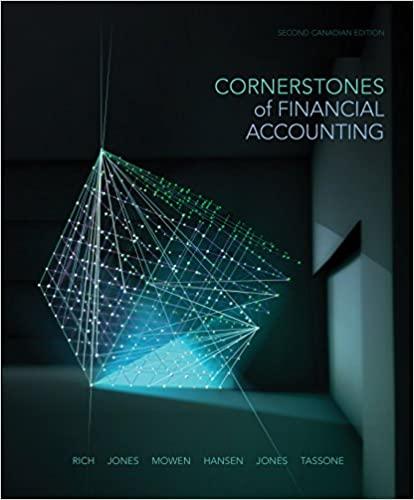Question
Advanced Accounting Chapter 1 Extra Problems Large Corporation Large Corporation is considering a merger with Local Company, one of its suppliers. In order to determine
Advanced Accounting Chapter 1 Extra Problems
Large Corporation
Large Corporation is considering a merger with Local Company, one of its suppliers. In order to determine a fair offering price, Large has accumulated the following information:
Local Company Estimated
Book Values Market Value
Total identifiable assets $ 250,000 $ 300,000
Total liabilities 150,000 150,000
Owners equity $ 100,000
In the last five years, Local has earned a total of $100,000. Large expects that Locals future earnings will be close to its average past earnings for at least the next five years. Normal earnings for similar firms during the past five years have averaged 10 percent return on net assets. However, Large wants a minimum rate of return of 12 percent. Estimate a reasonable offering price for Large to offer Local based on excess earnings. (Hint-Use 6 steps of excess earnings approach on page 16)
Eden Company
Eden Company is trying to decide whether to acquire Bloomington Inc. The following balance sheet for Bloomington Inc. provides information about book values. Estimated market values are also listed, based upon Eden Company's appraisals.
|
| Bloomington Inc. Book Values | Bloomington Inc. Market Values |
| Current Assets | $ 450,000 | $ 450,000 |
| Property, Plant & Equipment (net) | 1,140,000 | 1,300,000 |
| Total Assets | $1,590,000 | $1,750,000 |
|
|
|
|
| Total Liabilities | $700,000 | $700,000 |
| Common Stock, $10 par value | 280,000 |
|
| Retained Earnings | 610,000 |
|
| Total Liabilities and Equities | $1,590,000 |
|
Eden Company expects that Bloomington will earn approximately $290,000 per year in net income over the next five years. This income is higher than the 14% annual return on tangible assets considered to be the industry "norm."
Compute an estimation of goodwill and a possible offering price based on the information above that Eden might be willing to pay, under each of the following additional assumptions, (Hint-Use 6 steps of excess earnings approach on page 16)
(1) Eden is willing to pay for excess earnings for an expected life of 4 years (undiscounted).
(2) Eden is willing to pay for excess earnings for an expected life of 4 years, which should be
capitalized at the industry normal rate of return.
(3) Excess earnings are expected to last indefinitely, but Eden demands a higher rate of return of
20% because of the risk involved.
MATCHING
Match the terms in the list to the definitions below. Each term may be used only once.
A. Poison pill G External expansion M. Statutory merger
B. White knight H. Internal expansion N. Statutory consolidation
C. Leveraged buyout I. Horizontal integration O. Stock acquisition
D. Friendly combination J. Vertical integration P. Goodwill
E. Hostile combination K. Conglomerate merger
F. Comprehensive income L. Economic entity concept
_____ 1. A company combines with another, unrelated company in order to diversify
_____ 2. A company grows by retaining all its profits in the business
_____ 3. The excess of the purchase price of a company over the fair value of stock acquired
_____ 4. A takeover defense which includes issuing stock rights to existing shareholders so they may
buy more stock at a price lower than market share
_____ 5. A combination where two existing companies join to make a third company
_____ 6. All revenue, expenses, gains and losses are included
_____ 7. A combination where a company buys one or more of its competitors
_____ 8. Purchase of a company by its managers and third-party investors, often using debt
_____ 9. A combination where the boards of two companies mutually agree to the acquisition
_____10. Encouraging a third firm to buy a company that is the target of an unfriendly combination
_____11. A means of increasing the size of a company by acquiring another company
_____12. Emphasizes control of the whole by a single management
_____13. The purchase of one company by another where the two companies continue to be separate legal entities
_____14. A combination where the management of the target company resists the acquisition
_____15. A combination where a company buys its suppliers and/or its customers
_____16. A combination where one company buys and absorbs another company
Step by Step Solution
There are 3 Steps involved in it
Step: 1

Get Instant Access to Expert-Tailored Solutions
See step-by-step solutions with expert insights and AI powered tools for academic success
Step: 2

Step: 3

Ace Your Homework with AI
Get the answers you need in no time with our AI-driven, step-by-step assistance
Get Started


